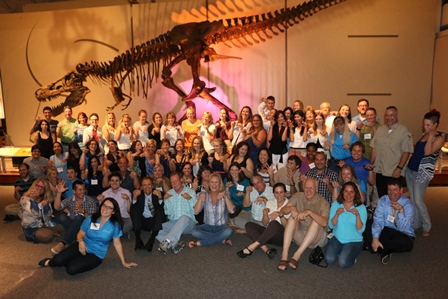Conference on aquatic ecosystem health draws participants from nine countries

Participants in the Third International Ranavirus Symposium pose for a group shot during a social event held at the Florida Museum of Natural History. (Photo courtesy of Dr. Tom Waltzek)
More than 170 participants from nine countries came to Gainesville to take part in two back-to-back meetings that made up the first Aquatic Ecosystem Health Conference. The event brought together experts in the areas of ranaviruses and marine mammal health.
The Third International Ranavirus Symposium and the Fifth Florida Marine Mammal Health Conference, hosted and sponsored by UF’s Aquatic Animal Health program, drew a diverse group of attendees, including scientists, managers, wildlife biologists, veterinarians, policy makers and students, said Dr. Tom Waltzek, co-director of the Aquatic Animal Health Program and a member of the organizing committee for both meetings.
“Our participants interacted and shared their expertise and passion for aquatic ecosystem health issues,” Waltzek said.
Conference events included lectures, topical discussions, poster sessions, wet labs, field trips, and a social evening at the Florida Museum of Natural History.

Participants in the Fifth Florida Marine Mammal Health Conference pose for a group shot at the Florida Museum of Natural History. (Photo courtesy of Dr. Tom Waltzek)
Dr. Mike Walsh, a co-director of the Aquatic Animal Health program, noted that this year’s Aquatic Ecosystem Conference incorporated the concept of One Health, examining the complicated connections between the people, the marine environment and all of the species found there, from invertebrates to marine mammals. It added a unique panel on the last day, hosted by Dr. John Reynolds, a Mote Marine senior scientist, that included Fish and Wildlife Service’s Larry Williams, Save the Manatee’s Katie Tripp, the college’s Dean Jim Lloyd, UF wildlife economist Dr. Elizabeth Pienarrr, social scientist Adrian Cerazo and Walsh, who discussed how to move from scientific documentation of aquatic issues toward ecosystem solutions.
“We decided, with some inspiration and discussion with our partners, to expand it to incorporate the aquatic ecosystem health concept, which says that all things are interconnected and that problems in the animals, people and environment influence and effect each other,” Walsh said. “This is a paradigm that embraces the innovative approach of having human medicine and veterinary medicine working with environmental scientists and researchers to look at the whole puzzle and not each specialty alone.”











